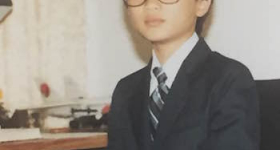Okay, so we disagree about where interracial relationships start. But once they get going, get married, have kids, what then? Do you talk to them about race? About racism? Do you let them know that there is racism in the world in general? Do you warn them that they might be subject to it themselves?
Some parents (often, but not always white parents) feel that multiracial children shouldn't be saddled with a previous generation's hangups. Just raise 'em to be color blind and they will save the world. Other parents (often, but not always, parents of color) feel that racism won't be "over" for awhile, and their children should be prepared for whatever comes, so that they don't get hurt or can minimize the damage. Even when parents agree on the principle, though, there's also the question of when and how to talk to a child about racism.
So what do you think? Should Asian Americans be actively preparing their multiracial children to encounter racism? Will multiracial Asian Americans born after the millenium encounter racism? Does this depend upon what kind of mix they are? (e.g.: do white/Asian multiracials have a fair chance of not seeing racism, while black/Asian multiracials don't? etc.) The world is changing awfully fast, so if these children do encounter racism, what kind of racism will it be? Will we be able to recognize it when it comes? And how do we talk to millenial multiracials about racism? How do we prepare them for a world we can't foresee, but know might be dangerous to them?
As usual, there will be no name-calling, insults, personal attacks, cursing, straw men arguments, or excessive passion on this thread. Please try to stick to your own experience and do not stereotype about the experience of others. I will keep personal attacks away, but please be aware that when you make your personal experience public on this forum, other people will read and respond to it analytically, and that is to be expected (within reasonable limits.)
Have at it!









Comments
As a multiracial person (Asian and white) who grew up on the West Coast as well as the Midwest and Texas, I have a hard time knowing where to start in responding to this question. I always knew on some level that I was multiracial-- at least I knew that Japanese culture was a big part of my life at home and that this was pretty unique (especially in the Midwest).
I remember experiencing racism on some occasions while I was growing up, but despite that I wouldn't say that I was ever particularly "race-conscious" until I went off to college in New England and had to figure myself out culturally as an individual outside the context of my family. I guess this fact alone means that my parents never overtly "taught" me about racism, warned me that I might face it, or made me feel in any way that I should be on the defensive because of who I am racially.
Growing up, whenever my mom (who grew up in Japan) made comments about not feeling at home around white people, or feeling like people thought less of her because of her race, I would tell her that she was being racist by assuming this, that all my white friends and their families were perfectly accepting of people of other races, and the majority of other white people probably were as well.
Years later, I know I couldn't have understood what she felt then. Being the only Asian person around in a few of the places we lived (and especially being Asian from Asia, rather than Asian American) must have been difficult in ways I didn't know anything about, and I'm sure most of the racism she perceived was very real.
Rather than being "taught" about racism, I watched my mom's response to it, and when I was experienced enough, I was finally able to process that and the acts of racism that faced me personally throughout my life, and began making sense of it on my own when I was ready.
I think whatever our racial background may be, we will all experience racism at some point just by virtue of living in such a diverse country, whether we experience it personally or watch someone we care about experience it. It's important to understand that racism exists and it's crucial to have someone around to talk about it. But in terms of how to talk to multiracial kids about racism, I think the important thing is to not instill children with a sense of bitterness by teaching them that racism is something they will inevitably face, thus essentially teaching them that they don't belong.
Kids are amazing because they don't naturally think in terms of the limiting categories that we as adults use to filter our experiences, and I think that should be allowed to continue as long as it can. By this, I don't mean that we should encourage kids to be color-blind because not only is that impossible, it is seriously problematic too. I think the most important thing that parents can do for multiracial kids is to teach them to be open and to expose them to as many people as they can. Kids are smart-- they pick up on things on their own, and they will ask questions. The important thing is to be there to answer those questions and encourage dialogue, rather than preemptively teaching kids to be bitter, which may make them more likely to have racist views themselves.
Well, I'll be the first to jump in. As an Asian American mother with Hapa kids, I keep try to keep an eye on what my kids are encountering or exposed to. Honestly, I thought of racism as a subject to be discussed toward the teenage years, but society will bring it up much earlier than that.
My child came home from preschool, asking why some people don't like dark skin and only like light skin. It was January, and upon asking a few more questions, I learned that the teacher had read a story about Martin Luther King Jr. in class. It was a good teachable moment to talk about how people sometimes treat others badly because the way they look, and how that's not right.
As for preparing my children for racism that is aimed at them, I don't want to set them up to expect to be treated unfairly. One thing I've encoutered is that many books, even by Asian American authors, aimed at elementary age kids describe the Asian characters as outcast or marginalized. So far (*knock on wood*) that is not my childrens' experience. But they know racism exists, and if they encounter it, they know what to call it and hopefully, how to start talking about it .
While the severity varies, EVERYONE encounters racism at one point or another. Each person, multiracial or otherwise, has unique experiences. It does not help to fully encourage BS ideas such as color blindness. This helps change little and can actually regress the evolution of race relations in America and everywhere else. The world is not as a happy of a place as we'd like it to be. Sugar coating realities to our children will cause them to carry the issues we already have ourselves. I for one will tell my kids, "Even though you're American, there will always be people out there who will look at you from a certain perspective and treat you unfairly because you LOOK different. All you can do is be proud of who you are and know that your heritage, every single part of it, is special. If they can't accept you for who you are, that's their problem. Don't let it bring you down. Instead, gain strength from their ignorance."
Okay, I probably wouldn't say this to them exactly, but the gist of it.
Should Asian Americans be actively preparing their multiracial children to encounter racism?
It would be a lot easier if I could just sweep it under the rug and just tell my kids to march to the “Let’s Hold Hands Cuz We’re All Humans” beat, so I need to find a way to sugar-coat how the deeply ingrained white supremacist capitalist patriarchy and its accompanying racial caste system have psychological and sociological consequences within the AA community.
Will multiracial Asian Americans born after the millenium encounter racism?
Probably less so if you look like Keanu Reeves or Lindsay Price. Just a guess.
Does this depend upon what kind of mix they are? (e.g.: do white/Asian multiracials have a fair chance of not seeing racism, while black/Asian multiracials don't? etc.)
See answer above.
The world is changing awfully fast, so if these children do encounter racism, what kind of racism will it be?
An American melting pot defined by white culture. Always is and always will be ‘bout oppressor/oppressed within the context of economic power.
Will we be able to recognize it when it comes?
Racism evolves, adapts, becomes more sophisticated with time, so some will, most won’t. The current flavor of the month seems to be the “post-race” colorblind thing.
And how do we talk to millenial multiracials about racism?
I myself would start with something like “you know, there’s a well-known experiment where black kids were asked to choose from a white and a black skin doll and the majority of them picked the white one. Do you think it‘s because the white ones were more awesome?” Ah, the white normative gaze starts early.
How do we prepare them for a world we can't foresee, but know might be dangerous to them?
The best you can.
Minority parents of biracial children should definitely talk to their children about race and potential racism. It is a mistake to assume color-blindness and to pretend like race won't impact their children's lives growing up. I think far too many biracial Asian children grow up in environments where their Asian parent doesn't ingrain any sense of their ethnic heritage/identity, and the kids grow up basically acting and identifying as "White". This is pretty different from Black or Jewish kids from mixed marriages, who oftentimes grow up with a very strong sense of Black or Jewish identity as well as an appreciation, respect, and desire to protect their cultures. Also, the other blog post wasn't about racism in interracial relationships, but more about identity. Whether one talks about interracial marriages, or the children of these marriages, more discussion should be on why Asians and Asian Americans want to completely assimilate into the dominant White power/social structure so much, rather than promote multiculturalism and be proud of one's roots for oneself and for one's children.
This is sort of a pet issue of mine. First off, people look at our family and either look confused or think we took off from the hospital with the wrong kid. I'm mostly Filipino, my husband is Korean and white, and while our daughter definitely has more of her dad's features, she has super light hair and therefore doesn't really look like either one of us. As a result, when I'm out with her by myself, I'm the one who ends up experiencing some form of racism -- people tend to think I'm her nanny -- but the verdict is still out on how she'll experience race and racism, and I don't want to assume she'll experience it the same way I have.
I definitely plan on actively preparing her and teaching her about racism (just before she was born, I got her Howard Zinn's People's History of the American Empire), but I'm still not sure how.
Why is the assumption that only minorities should raise their children with an awareness of racism? Shouldn't everybody be taught what bigotry is, how it has affected past generations, and what forms it is taking on today? Leaving aside the issue of whether or not one is likely to become a victim of racism oneself, how is one to recognize injustice and prejudice and support people who are victims of these if one never learns that bigotry is a real force in society that affects people's lives? As for "colorblindness", ask the French whether colorblindness helped them integrate their immigrant communities of color and treat them fairly. Instead, the belief in "colorblindness" just made it taboo for minorities to call out racism when they were its victims and ended up magnifying racism and resentment.
Thanks for starting this thread. Like one of the previous posters, I am half Asian, half white, and didn't start to grasp the tools and vocabulary for my identity until college. My parents never explicitly spoke to my sister and me about being biracial, and I wish they had.
When I have kids, the conversation(s) won't be entitled, "Racism," per say, but I will definitely help them identify the cultures that shape them, the words they might use to describe themselves, and share the challenges I have encountered. Even more important, I will provide them resources such as books with characters who are mixed like they are, point out multiracial role models, and emphasize writing such as that by Dr. Maria P. P. Root, who wrote (among much else) a "Bill of Rights for People of Mixed Heritage," available here:
http://www.drmariaroot.com/doc/BillOfRights.pdf
One article I read recently on the issue of multiracial kids' development that resonated very strongly with me is "Beauty and the Beast: On Racial Ambiguity" by Carla K. Bradshaw. Here is an excerpt: "The development of healthy self-esteem and an integrated sense of self is more complicated for the biracial person than for the monoracial person... [existing] theories [of development], usually based on White monocultural experience, fail to incorporate and accommodate the constant questioning to which the miniority monoracial and biracial child is subjected regarding identity: What are you? Are you American? Let me guess what you are! Although the monoracial child may find security in the ability to assert unambiguous racial identity, the biracial child does not have access to such a simple response. Monoracial people are also less likely to experience disconfirmation or disbelief of the personal data they do reveal: You're kidding! You don't look it! YOu look more (other ethnic group). These are examples of ways in which the 'self' of the biracial child or person is constantly challenged."
It's that experience of constant questioning and, often, disbelief from others in response to how one self-identifies that I will surely prepare my children for. I don't know if I'd call that experience racism--it feels more like ignorance and, in turn, disrespect... Hopefully as the multiracial community grows, the world will become more accustomed to stretching minds to accommodate us label- and otherwise.